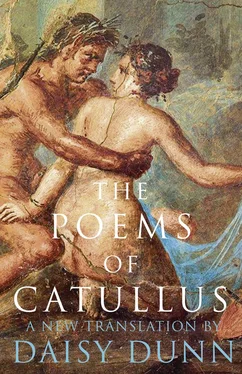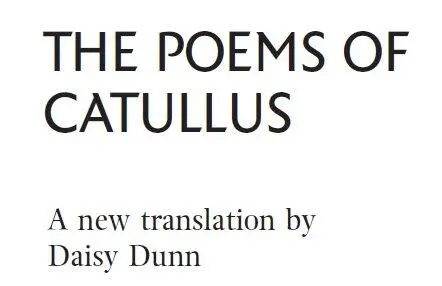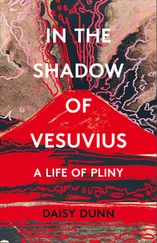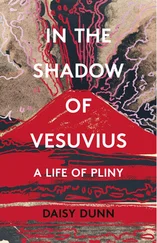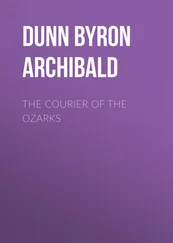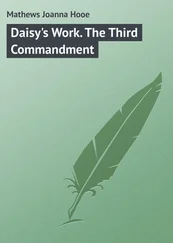
William Collins
An imprint of HarperCollins Publishers
1 London Bridge Street
London SE1 9GF
WilliamCollinsBooks.com
This eBook first published in Great Britain by William Collins in 2016
Translation © Daisy Dunn 2016
Daisy Dunn asserts the moral right to be identified as the translator of this work
A catalogue record for this book is available from the British Library
All rights reserved under International and Pan-American Copyright Conventions. By payment of the required fees, you have been granted the non-exclusive, non-transferable right to access and read the text of this e-book on-screen. No part of this text may be reproduced, transmitted, down-loaded, decompiled, reverse engineered, or stored in or introduced into any information storage and retrieval system, in any form or by any means, whether electronic or mechanical, now known or hereinafter invented, without the express written permission of HarperCollins.
Source ISBN: 9780007582969
Ebook Edition © January 2016 ISBN: 9780007582976
Version: 2016-01-07
If any of you chance to become readers
Of my untimely ramblings and your hands
Do not tremble to thumb my scroll …
Contents
Cover
Title Page
Copyright
Introduction
The Poems
I
II
III
IV
V
VI
VII
VIII
IX
X
XI
XII
XIII
XIV
XIVb
XV
XVI
XVII
XXI
XXII
XXIII
XXIV
XXV
XXVI
XXVII
XXVIII
XXIX
XXX
XXXI
XXXII
XXXIII
XXXIV
XXXV
XXXVI
XXXVII
XXXVIII
XXXIX
XL
XLI
XLII
XLIII
XLIV
XLV
XLVI
XLVII
XLVIII
XLIX
L
LI
LII
LIII
LIV
LV
(LVIIIb)
LVI
LVII
LVIII
LIX
LX
LXI
LXII
LXIII
LXIV
LXV
LXVI
LXVII
LXVIII
LXIX
LXX
LXXI
LXXII
LXXIII
LXXIV
LXXV
LXXVI
LXXVII
LXXVIII
LXXVIIIb
LXXIX
LXXX
LXXXI
LXXXII
LXXXIII
LXXXIV
LXXXV
LXXXVI
LXXXVII
LXXXVIII
LXXXIX
XC
XCI
XCII
XCIII
XCIV
XCV
XCVb
XCVI
XCVII
XCVIII
XCIX
C
CI
CII
CIII
CIV
CV
CVI
CVII
CVIII
CIX
CX
CXI
CXII
CXIII
CXIV
CXV
CXVI
Notes
About The Publisher
On an autumn night in 1962 the poet Robert Lowell ambled through Cambridge, Massachusetts, as far as 35 Brewster Street. He had walked this broad, tree-lined road before as a young student, grasping a bundle of pages, pale grey with pencilled words. His manuscript had weighed heavily upon him as he approached a large gabled house on the road’s midpoint. He was now forty-five and no longer in need of affirmation of his talent; his verse translation of Racine’s Phaedra had recently been feted . But he longed to recall the bewildering array of what lay beyond the walls of this dwelling.
In January 1963 his sometime mentor Robert Frost, the great poetic master of pastoral and everyday experience, passed away. ‘The lights were out that night; they were out for good now,’ wrote Lowell, reflecting on the moment, just months earlier, that he revisited the cold threshold of Frost’s former home: ‘Its narrow gray wood was a town cousin of the farmhouses he wrote about, and stood on some middle ground between luxury and poverty. It was a traveler from the last century that had inconspicuously drifted over the customs border of time … I can easily imagine the barish rooms, the miscellaneous gold-lettered old classics, the Georgian poets, the Catullus by his bedside, the iron stove where he sometimes did his cooking, and the stool drawn up to his visitor’s chair so that he could ramble and listen.’ 1
Robert Frost read the poetry of Catullus often, mesmerised by his words and the weight and complexity of his sentiments. New England shared little ground with ancient Verona, the nascent town south of the Alps where Catullus was born c .82 BC, or Rome, where he lived in the fraught times before Julius Caesar waged his civil war and the Republic fell to pieces. But Catullus’ passions were timeless, and free, far outliving his brief thirty years on this earth. His ‘little book’ ( libellus ), a series of over a hundred poems referred to merely by number, and arranged by a mysterious hand in an order that lacks chronology – though not thought – appealed to Frost’s appetite for subtle expression. There could be no better place for Catullus’ poetry book than the bedside, where Frost kept the slim volume Lowell spied in his clapboard house.
Gaius Valerius Catullus, whom scholars often see as the inventor of Latin love elegy, once wrote of how, ‘Undone by passion I tossed and turned all over the bed …’ 2He had spent a long ‘lazy day’ drinking wine, carousing and composing verse with his dear poet friend, Gaius Licinius Calvus Macer, whom he referred to merely as Calvus (‘Suave, suave Calvus’, ‘my dear Calvus’) in further poems. Catullus also wove the finest poem he ever wrote around a bedspread, which he embroidered with the myths of Theseus and Ariadne, sister of the Phaedra who inspired Robert Lowell’s play of 1961.
Frost was probably unaware of how far his bedside copy of Catullus coloured Lowell’s experience of his smart Brewster Street home. Catullus’ book shone more brightly than any of the others in his library, which Lowell’s eyes darted off too eagerly to render more than ‘miscellaneous’. The younger poet’s description of the house itself as ‘a town cousin of the farmhouses he wrote about’ even evokes one of Catullus’ poems, in which he described his retreat on the outskirts of Rome: ‘Dear country pile of mine, whether Sabine or Tiburtine … your suburban dwelling …’ 3
The grandeur of Frost’s former residence and its smart surroundings might have felt at variance with what Lowell described as ‘some middle ground between luxury and poverty’, but Catullus courted the same indeterminate line. Across his 117 surviving poems, which are translated in full in this volume, 4arise several references to men who are cash poor but asset rich. 5A certain Furius, very probably a contemporary rival poet called Furius Bibaculus, ‘has neither slave nor savings’, but possesses a little villa with ‘a bill fifteen-thousand-two-hundred steep’ (Poem 26). Poverty, moreover, was a rich man’s fashion. While Catullus came from a wealthy family, with houses in Verona and on the most beautiful peninsula of Lake Garda (Sirmione, see Poem 31), and who counted among their friends and dining guests Julius Caesar himself, Catullus could still complain that his wallet was empty, ‘full of cobwebs’, and request that a friend provide him with the food and accoutrements required for a lively dinner party (Poem 13).
If Frost’s house recalled a ‘traveler from the last century’, then Catullus’ poetry was the place where travellers converged and traded in new tongues. Familiar as he was with the poetry of his Greek and Roman forebears, he ingeniously combined ideas from a variety of genres, including epigram, epic, and comedy, and imposed upon them a new vocabulary, forging many neologisms – new words – and affectations; he was particularly partial to the diminutive, which he employed for pathos and affection as often as he did for size. In Poems 2 and 3, for example, he describes the sparrow that belongs to his favourite lover, whom he refers to in his poetry as ‘Lesbia’. She was, in all likelihood, Clodia Metelli, from one of the oldest and most prominent families in Rome. She was married to the Roman senator Metellus Celer until 59 BC, when she was widowed. Catullus describes what was nominally her pet bird and the ‘small release’, solaciolum (a diminutive) it gave her from her frustration. In death, the sparrow is miselle passer (‘poor little sparrow’); in life, deliciae … puellae, his ‘girl’s darling’.
Читать дальше
